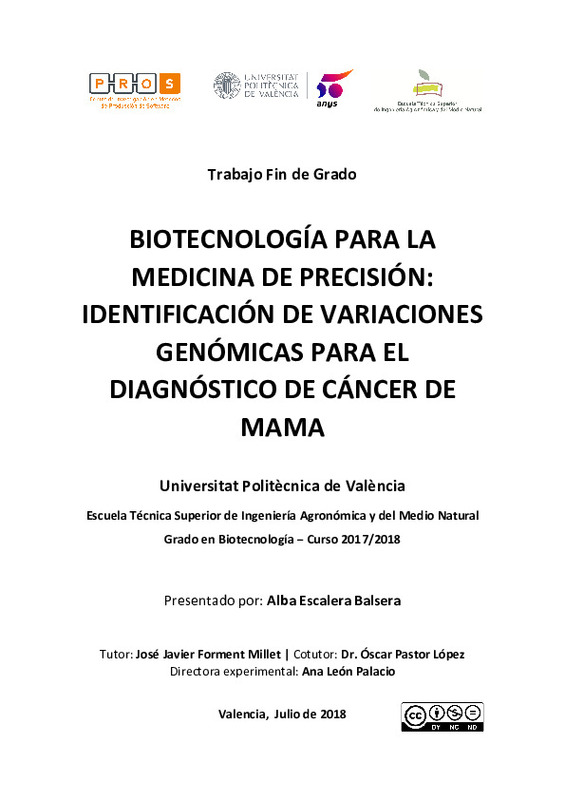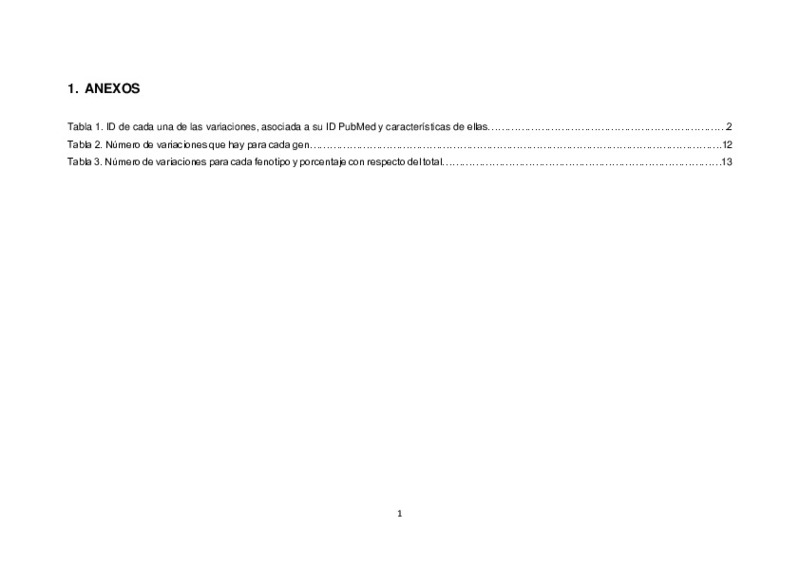JavaScript is disabled for your browser. Some features of this site may not work without it.
Buscar en RiuNet
Listar
Mi cuenta
Estadísticas
Ayuda RiuNet
Admin. UPV
Biotecnología para la Medicina de Precisión: Identificación de Variaciones Genómicas para el Diagnóstico de Cáncer de Mama
Mostrar el registro sencillo del ítem
Ficheros en el ítem
| dc.contributor.advisor | Forment Millet, José Javier
|
es_ES |
| dc.contributor.advisor | Pastor López, Oscar
|
es_ES |
| dc.contributor.advisor | León Palacio, Ana
|
es_ES |
| dc.contributor.author | Escalera Balsera, Alba
|
es_ES |
| dc.date.accessioned | 2018-09-18T07:18:27Z | |
| dc.date.available | 2018-09-18T07:18:27Z | |
| dc.date.created | 2018-07-18 | |
| dc.date.issued | 2018-09-18 | es_ES |
| dc.identifier.uri | http://hdl.handle.net/10251/107582 | |
| dc.description.abstract | [ES] El manejo eficiente de datos es un problema esencial para garantizar un diagnóstico correcto en el ámbito de una Medicina de Precisión (MP) efectiva y adecuada. Ciencia de Datos y Biotecnología deben unir sus fuerzas para que ese objetivo sea alcanzable, obteniendo cada vez más datos y convirtiéndolos en información valiosa. En esa dirección, el objetivo de este trabajo es identificar las variaciones genómicas para el diagnóstico de cáncer de mama mediante la metodología SILE: Search-IdentificationLoad-Exploitation (Búsqueda-Identificación-Carga-Explotación). Basándose en dicha metodología, el primer paso es seleccionar un conjunto adecuado de fuentes de datos genómicas. Se iniciará el trabajo explorando cuatro bases de datos (ClinVar, Ensembl, GWAS catalog y SNPedia) y se buscarán en ellas todas las variaciones genómicas relacionadas con el cáncer de mama. Una vez obtenidas las variaciones candidatas, se filtrarán según un conjunto de criterios de calidad que guíen la selección definitiva: entre ellos, que al menos haya un artículo en PubMed (base de datos bibliográfica de referencia en la investigación bioinformática y biogenómica) que sustente la relación entre la variación y el fenotipo de estudio, que esta tenga un determinado significado clínico y que los resultados del estudio cumplan ciertos criterios estadísticos mínimos (lo cual se hace mediante una revisión bibliográfica manual). El objetivo final es identificar aquellas variaciones que tienen mayor riesgo de causar el fenotipo analizado, permitiendo por lo tanto que un diagnóstico fiable sea posible. El proceso de identificación debe de asegurar que las variaciones seleccionadas cumplen los criterios requeridos, y garantizar que los datos proporcionados por las bases de datos son correctos y se corresponden con lo que se busca en este estudio. Finalmente, las variaciones serán cargadas en una plataforma software para el diagnóstico genómico como evidencia experimental de que la MP de la que hablamos es efectivamente viable y puede ser explotada por el personal sanitario en el ámbito del diagnóstico clínico. | es_ES |
| dc.description.abstract | [EN] The efficient management of data is an essential problem to ensure a correct diagnosis in the field of an effective and appropriate Precision Medicine (PM). Data Science and Biotechnology must join forces to make this goal reachable, obtaining more and more data and converting them into valuable information. In that direction, the objective of this work is identify genomic variations for the diagnosis of breast cancer using the SILE methodology: Search-Identification-Load-Exploitation. Based on this methodology, the first step is to select an appropriate set of genomic data sources. The work will begin by exploring four databases (ClinVar, Ensembl, GWAS catalog and SNPedia) and all the genomic variations related to breast cancer will be explored. Once the candidate variations have been obtained, they will be filtered according to a set of quality criteria that guide the final selection. Such criteria will include that at least one of the articles in which the variations (variation) is studied appears in PubMed (reference bibliographic database in bioinformatics and biogenomics research); that its mutation has a certain clinical significance; and that the article fulfils certain statistic data (which is checked using a literature review by hand). The final objective is to identify those variations that have a higher risk of causing the analysed phenotype, thus, allowing a reliable diagnosis to be possible. The identification process must ensure that the selected variations satisfy the required criteria, and that the data provided by the databases are correct and correspond to what is searched in this study. Finally, the variations will be loaded into a software platform for genomic diagnosis as experimental evidence that the PM we are talking about is indeed viable and can be exploited by health personnel to offer personalized genomic medicine to patients. | es_ES |
| dc.format.extent | 55 | es_ES |
| dc.language | Español | es_ES |
| dc.publisher | Universitat Politècnica de València | es_ES |
| dc.rights | Reconocimiento - No comercial - Sin obra derivada (by-nc-nd) | es_ES |
| dc.subject | SILE methodology | es_ES |
| dc.subject | Medicine of Precision (PM) | es_ES |
| dc.subject | Genomic variations | es_ES |
| dc.subject | Breast cancer | es_ES |
| dc.subject | Metodología SILE | es_ES |
| dc.subject | Medicina de precisión (MP) | es_ES |
| dc.subject | Variaciones genómicas | es_ES |
| dc.subject | Cáncer de mama | es_ES |
| dc.subject.classification | LENGUAJES Y SISTEMAS INFORMATICOS | es_ES |
| dc.subject.classification | BIOQUIMICA Y BIOLOGIA MOLECULAR | es_ES |
| dc.subject.other | Grado en Biotecnología-Grau en Biotecnologia | es_ES |
| dc.title | Biotecnología para la Medicina de Precisión: Identificación de Variaciones Genómicas para el Diagnóstico de Cáncer de Mama | es_ES |
| dc.type | Proyecto/Trabajo fin de carrera/grado | es_ES |
| dc.rights.accessRights | Abierto | es_ES |
| dc.contributor.affiliation | Universitat Politècnica de València. Departamento de Biotecnología - Departament de Biotecnologia | es_ES |
| dc.contributor.affiliation | Universitat Politècnica de València. Escuela Técnica Superior de Ingeniería Agronómica y del Medio Natural - Escola Tècnica Superior d'Enginyeria Agronòmica i del Medi Natural | es_ES |
| dc.description.bibliographicCitation | Escalera Balsera, A. (2018). Biotecnología para la Medicina de Precisión: Identificación de Variaciones Genómicas para el Diagnóstico de Cáncer de Mama. http://hdl.handle.net/10251/107582 | es_ES |
| dc.description.accrualMethod | TFGM | es_ES |
| dc.relation.pasarela | TFGM\91207 | es_ES |
Este ítem aparece en la(s) siguiente(s) colección(ones)
-
ETSIAMN - Trabajos académicos [3541]
Escuela Técnica Superior de Ingeniería Agronómica y del Medio Natural







